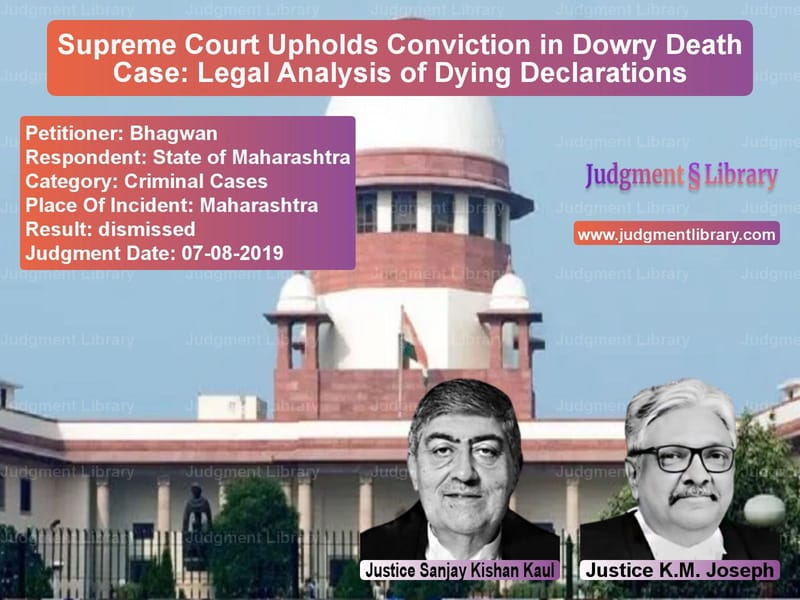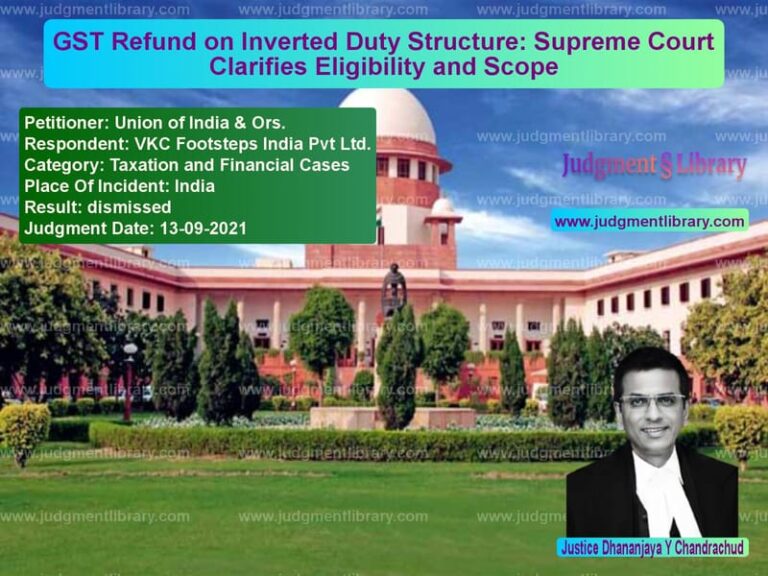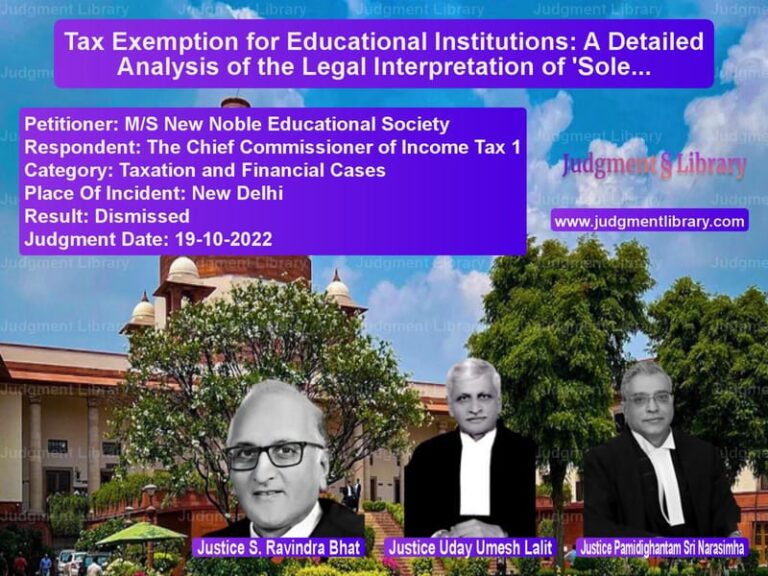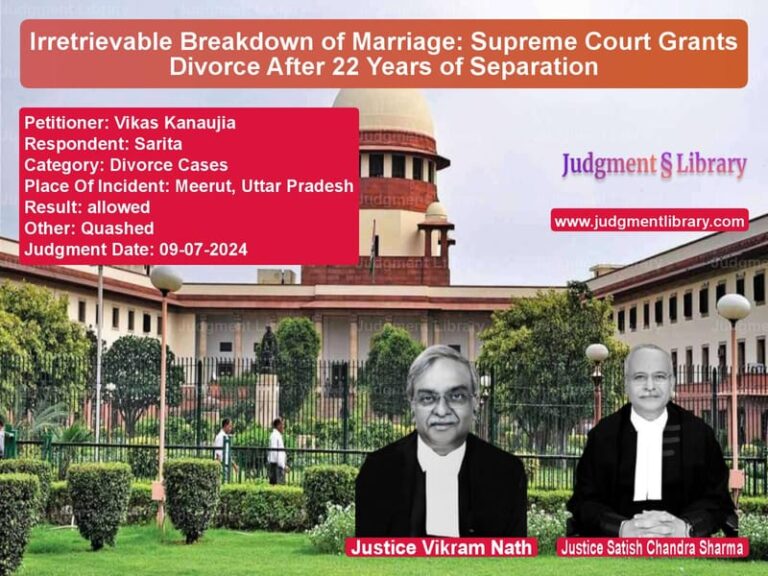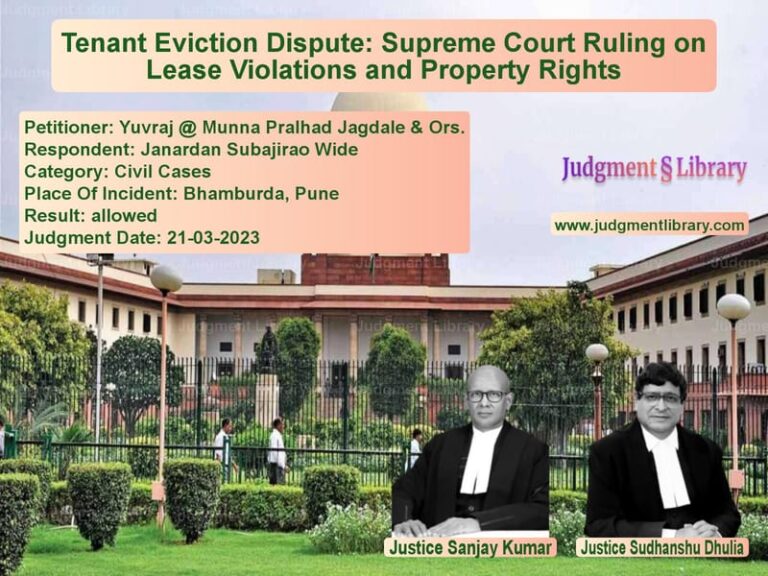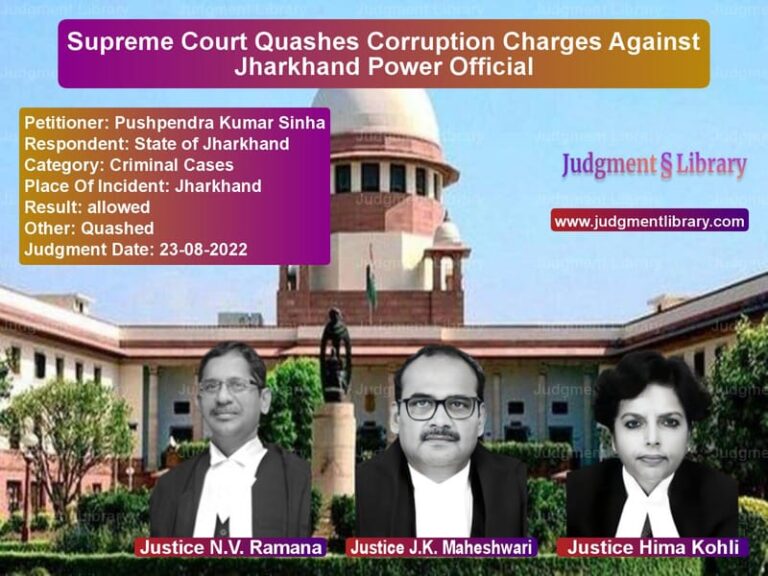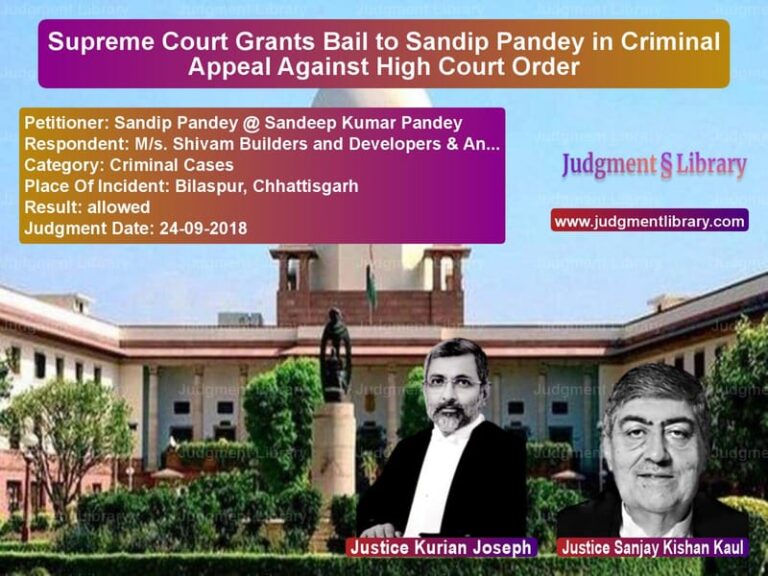Supreme Court Upholds Conviction in Dowry Death Case: Legal Analysis of Dying Declarations
The Supreme Court of India, in its judgment dated August 7, 2019, in the case of Bhagwan v. State of Maharashtra, upheld the conviction of the accused under Section 302 of the Indian Penal Code (IPC). The case involved the tragic death of the appellant’s wife due to burn injuries, allegedly inflicted by the appellant himself. The central question before the Court was the reliability of the dying declaration, which was the main piece of evidence leading to the conviction.
Background of the Case
The appellant, Bhagwan, was married to the deceased in 1995. The couple had two sons. However, their marital relationship was strained due to allegations that the appellant had an illicit affair and was addicted to alcohol. The prosecution alleged that on April 19, 1999, at around midnight, the appellant, in a drunken state, physically assaulted his wife and then poured kerosene over her, setting her on fire. The victim was taken to the hospital two days later, where she recorded a dying declaration implicating the appellant.
On April 23, 1999, the victim succumbed to her injuries. The appellant was arrested and charged with murder under Section 302 IPC. The trial court convicted the appellant based on the dying declaration, and the High Court upheld the conviction. The appellant then challenged the judgment before the Supreme Court.
Legal Issues Before the Court
The Supreme Court considered the following legal issues:
- The reliability of the dying declaration recorded by the magistrate.
- The delay in taking the victim to the hospital and its impact on the case.
- Whether the injuries on the accused and his children supported the appellant’s defense of an accidental fire.
- Whether the prosecution had proved the case beyond a reasonable doubt.
Petitioner’s (Appellant’s) Arguments
The appellant contended:
- Accidental Fire: The burn injuries on himself and his two sons indicated that the fire was accidental, possibly caused by a fallen oil lamp.
- Delay in Medical Treatment: The appellant argued that the High Court erroneously held that the victim was taken to the hospital two days later when the evidence showed she was taken immediately after the incident.
- Unreliable Dying Declaration: The defense challenged the dying declaration, arguing that the victim had suffered 92% burns, which would have made it impossible for her to give a coherent statement.
- Failure to Examine Key Witnesses: The appellant contended that the prosecution had not examined crucial witnesses, including the mother-in-law of the deceased.
Respondent’s (State’s) Arguments
The prosecution argued:
- Clear and Unambiguous Dying Declaration: The victim had explicitly named the appellant as the one who poured kerosene on her and set her on fire.
- Medical Certification of Consciousness: The doctor who examined the victim certified that she was conscious and fit to give a statement.
- Prosecution’s Version Supported by Evidence: The presence of kerosene residues and the circumstances of the incident pointed to a case of homicide rather than an accident.
- Injuries on the Accused Do Not Prove Innocence: The appellant’s burn injuries were likely caused when the victim, in distress, ran around in the small room, inadvertently burning those around her.
Supreme Court’s Observations
The Supreme Court, led by Justices Sanjay Kishan Kaul and K.M. Joseph, analyzed the arguments and upheld the conviction, making the following key observations:
1. Reliability of the Dying Declaration
The Court ruled that the dying declaration was credible and reliable, dismissing the appellant’s contention that the victim was unfit to give a statement.
“The mere fact that a victim has suffered 92% burns does not make them incapable of making a dying declaration.”
2. No Undue Delay in Medical Attention
The Court accepted the prosecution’s clarification that the victim was taken to the hospital on April 21, 1999, and not after two days, as erroneously noted by the High Court.
3. Injuries on the Accused and Children Do Not Exonerate Him
The Court held that the injuries sustained by the appellant and his children did not indicate an accident.
“The burns on the appellant and his children are consistent with the victim’s desperate attempts to escape rather than an accidental fire.”
4. Dying Declaration Can Be Sole Basis for Conviction
The Court reaffirmed that a dying declaration, if found reliable, does not need corroboration.
“A dying declaration recorded in the presence of a doctor and a magistrate carries significant evidentiary value.”
Final Verdict
The Supreme Court dismissed the appeal and upheld the life sentence imposed by the lower courts, ruling:
- The dying declaration was truthful and reliable.
- The injuries on the accused and his sons did not indicate an accident.
- There was no miscarriage of justice in the trial.
Impact of the Judgment
This ruling has significant implications:
- Strengthening the Law on Dying Declarations: The judgment reiterates that a properly recorded dying declaration can be the sole basis for conviction.
- Protection of Victims in Domestic Violence Cases: The ruling reinforces the importance of judicial scrutiny in cases involving spousal abuse leading to death.
- Discouragement of False Defenses: The Court’s rejection of the accidental fire theory discourages attempts to evade justice through fabricated explanations.
Conclusion
The Supreme Court’s decision in Bhagwan v. State of Maharashtra is a landmark ruling in criminal jurisprudence, particularly in cases involving dying declarations. The judgment upholds the sanctity of a victim’s last words and reinforces that an accused cannot escape liability by concocting an alternative explanation inconsistent with evidence.
Petitioner Name: Bhagwan.Respondent Name: State of Maharashtra.Judgment By: Justice Sanjay Kishan Kaul, Justice K.M. Joseph.Place Of Incident: Maharashtra.Judgment Date: 07-08-2019.
Don’t miss out on the full details! Download the complete judgment in PDF format below and gain valuable insights instantly!
Download Judgment: Bhagwan vs State of Maharashtra Supreme Court of India Judgment Dated 07-08-2019.pdf
Direct Downlaod Judgment: Direct downlaod this Judgment
See all petitions in Murder Cases
See all petitions in Bail and Anticipatory Bail
See all petitions in Attempt to Murder Cases
See all petitions in Judgment by Sanjay Kishan Kaul
See all petitions in Judgment by K.M. Joseph
See all petitions in dismissed
See all petitions in supreme court of India judgments August 2019
See all petitions in 2019 judgments
See all posts in Criminal Cases Category
See all allowed petitions in Criminal Cases Category
See all Dismissed petitions in Criminal Cases Category
See all partially allowed petitions in Criminal Cases Category

